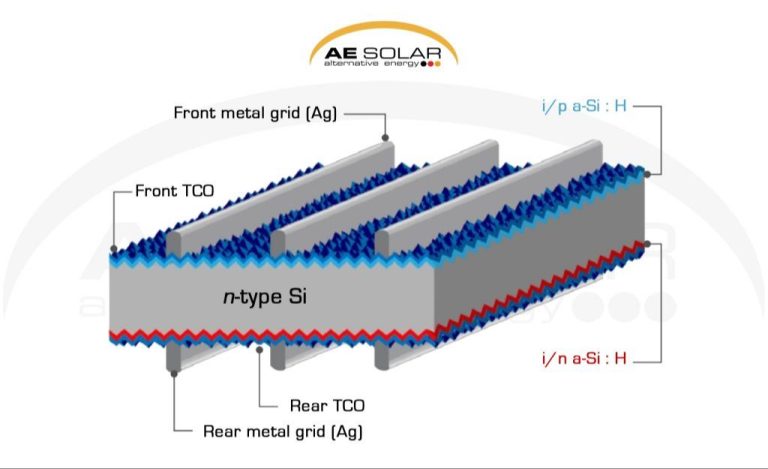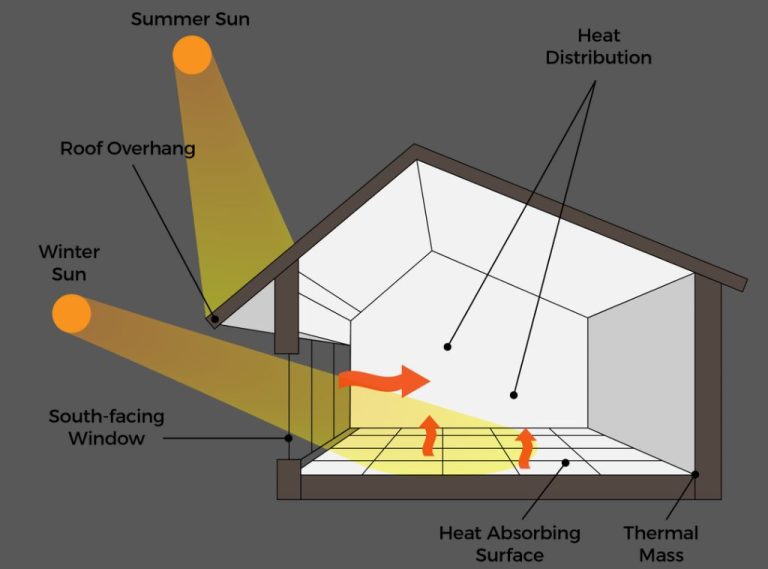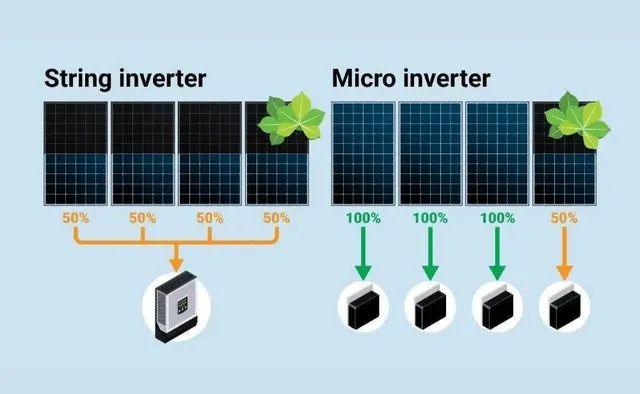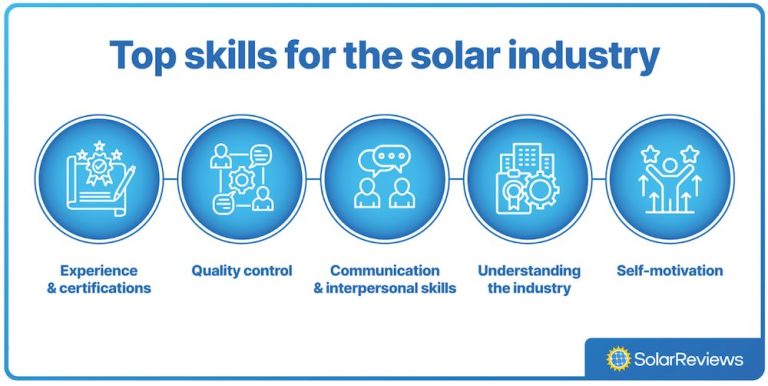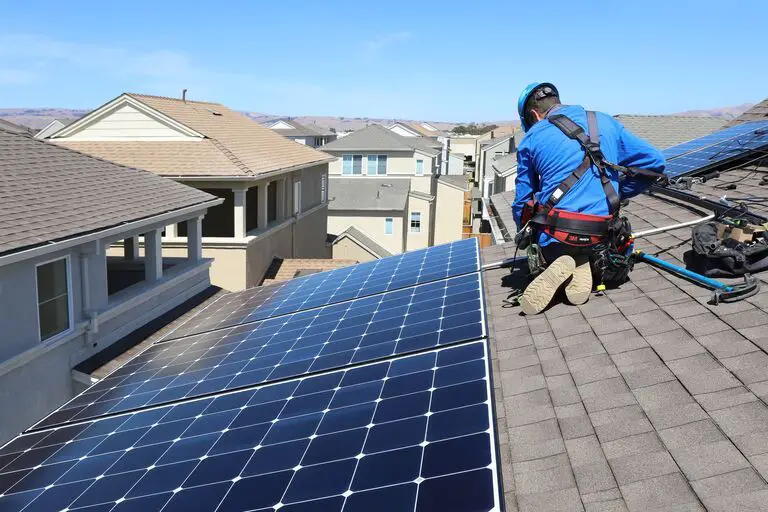Who Is The Best Company To Buy Solar Panels From?
The residential solar panel market has experienced exponential growth over the last decade. According to the Solar Energy Industries Association (SEIA), the solar industry has grown at an average annual rate of 24% since 2010, reaching over 110 gigawatts of solar capacity in the United States in 2022.
As of July 2022, the cumulative residential solar installation capacity in the U.S. is about 22,151 megawatts (MW), and the total residential solar adoption rate is about 3% according to Power Magazine. With dropping prices and federal tax incentives, more homeowners are choosing to go solar every year.
This guide provides an overview of the top solar panel companies to consider when deciding who to purchase residential solar panels from. We’ll cover what factors to look for, key companies in the market, cost considerations, available incentives, and more.
How Solar Panels Work
Solar panels work through the photovoltaic effect, which allows solar cells to convert sunlight directly into electricity. Solar cells are made of semiconductor materials like silicon that have a positive and negative layer. When sunlight hits the solar cell, the photons are absorbed by the semiconductor material, causing electrons to break free and flow through the circuit, generating an electric current.
The solar cells are wired together in a solar panel to generate more power. The direct current (DC) electricity generated flows to an inverter, which converts it into alternating current (AC) that can be used to power your home appliances and devices. Multiple solar panels can be linked to form a solar array.
The key factors that determine how much power a solar panel can produce include the efficiency of the solar cells, the intensity of the sunlight, which varies by location and climate, and the physical size of the solar panel. Over the past decades, advances in technology have steadily increased the efficiency of commercial photovoltaic solar panels from around 6% to over 22%. With high efficiency solar panels, you can generate more electricity using fewer panels.[https://watthive.com/solar-101/]
Factors to Consider When Choosing a Solar Panel Company
When selecting a solar panel company to install a residential or commercial solar energy system, there are several key factors to consider:
Expertise and Experience
Look for an experienced company that has been installing solar panels for several years. According to the U.S. Department of Energy, a good rule of thumb is to work with installers who have at least three years of experience (source). Ask about how long they have been in business and how many installations they have completed.

Reputation and Reviews
Research the company’s reputation and read reviews from past customers. Look for consistently positive reviews on independent consumer sites. Be wary of companies with many negative reviews about poor workmanship or bad customer service.
Warranties
Reputable solar companies will stand behind their work and equipment. Look for at least a 10-year warranty on installation workmanship and 25-year warranties on solar panels and inverters.
Customer Service
Choose a company that is responsive and provides good communication. You’ll want to work with a solar provider that answers questions thoroughly and makes you feel comfortable throughout the process.
Pricing
Get quotes from multiple installers to compare pricing. Beware of quotes that seem too good to be true. Make sure to consider the quality of the components and services offered, not just bottom line prices.
Top Solar Panel Companies
When choosing a solar panel company, some of the top manufacturers and installers to consider include Tesla, Maxeon, LG, Sunrun, and SunPower.
Tesla offers high-efficiency solar panels and complete solar roof systems. They have an excellent 25-year warranty on their solar panels. Maxeon manufactures the highest efficiency solar panels on the market, with panel efficiencies over 22%. LG and SunPower also produce extremely high quality and reliable solar panels. Sunrun is one of the largest solar installers in the U.S. and makes the process easy for homeowners.
When comparing companies, look at panel efficiency, product warranties, company reputation, and the full range of services offered. The installer you choose is just as important as the solar panel manufacturer. The best solar installers have years of experience, positive customer reviews, and make the process seamless for you.
Case Studies from Top Companies
Top solar companies frequently showcase best-in-class examples of successful solar installations. These case studies demonstrate their expertise and ability to deliver results for a wide range of customers.
For example, SolarCraft has installed many commercial solar systems in Northern California, including an 82.2 kW system for Graton Resort and Casino that is projected to offset 95% of their annual electric bill. The project included a carport structure with solar panels, benefiting the customer with energy savings and employees/guests with shade for parking.
Another leading installer, SunPeak, developed a 3.2 MW system for a Fortune 500 technology company in California. The massive rooftop solar array included over 9,000 panels and was one of the largest private commercial solar projects in the state at the time of installation.
These kinds of case studies from reputable solar companies like SolarCraft and SunPeak demonstrate how solar energy can successfully meet the needs of a wide variety of commercial and industrial customers, providing significant long-term savings.
Costs and Savings
The average cost of a residential solar panel system in the U.S. ranges from $15,000 to $25,000 before incentives, with most homeowners paying between $2.50 to $3.50 per watt for their system size. This works out to around $18,000 for a 6 kW system, which is sufficient for most single family homes.
There are several incentives available to help reduce the upfront costs of installing solar panels. The federal solar tax credit allows homeowners to deduct 26% of solar installation costs from their federal taxes through 2032. Many states and utilities also offer additional rebates and incentives. When combined, these incentives can reduce costs by 50-75%.
Over the lifespan of a solar system, owners can save $15,000 to $30,000 in electricity bills. Most solar panels have a useful life of 25-30 years. Exact savings will vary based on system size, electricity rates, location, and net metering policies. On average, a home solar system in the U.S. will pay for itself within 6-12 years if incentives are utilized.
To get an accurate estimate of solar costs and savings for your home, use a solar calculator. Quality calculators will take into account your location, average electricity usage, system size, and available incentives to provide a personalized estimate.
Federal and State Incentives
The federal solar tax credit, also known as the investment tax credit (ITC), allows homeowners to deduct 26% of the cost of installing a solar energy system from their federal taxes through 2032. After that, the ITC will drop to 22% for systems installed in 2033. This tax credit significantly reduces the cost of going solar for homeowners. The ITC applies to both residential and commercial solar installations.
In addition to the federal ITC, many states offer additional incentives for going solar like rebates, tax credits, and net metering. Net metering allows solar panel owners to get credit on their electricity bill for any excess power they generate and send back to the grid. This helps offset the cost of electricity used at night or on cloudy days when solar panels aren’t generating as much. Some of the top states for solar incentives include:
- California – Cash rebates through the California Solar Initiative
- Massachusetts – State income tax credits up to $1,000
- Arizona – Net metering at retail electricity rate
- New Jersey – Generous SRECs program
It’s important for homeowners to research both federal and state/local incentives when considering installing solar panels. Taking advantage of these credits, rebates, and net metering programs can drastically improve the return on investment for a solar energy system.
Important Safety Tips
Proper safety precautions should be taken when installing and maintaining solar panels. This ensures the safety of the homeowners, installers, and anyone else who may come into contact with the solar energy system.
It’s crucial to hire a licensed and certified solar installer. They have the proper training and expertise to safely handle electrical wiring and adhere to local building codes for permits and inspections. Certifications like NABCEP ensure qualified solar professionals have passed exams proving their competency.
Homeowners should also follow proper maintenance procedures. Solar panels should be visually inspected periodically to check for damage, debris buildup, corrosion, etc. Any issues should be addressed immediately to prevent potential hazards. Routine maintenance also keeps the panels operating efficiently.
Other key safety tips include (source):
- Install ground fault circuit interrupters
- Use proper protective equipment like goggles, gloves, harnesses
- Anchor equipment securely to avoid wind damage
- Keep a fire extinguisher nearby
Following these precautions and hiring certified professionals ensures solar panel systems are safe for homes.
Frequently Asked Questions
Many homeowners have common questions when considering going solar. Here we answer some of the most frequently asked questions about solar panels:
How do solar panels work? Solar panels consist of photovoltaic cells made from materials like silicon that convert sunlight into electricity through the photovoltaic effect. The direct current (DC) electricity generated is fed into an inverter to convert it into alternating current (AC) used in homes.https://www.energysage.com/solar/solar-faq/
Can solar panels work on cloudy days? Yes, solar panels can still generate electricity on cloudy days, just at reduced output. Solar cells rely on sunlight, not direct heat, so they can produce some electricity even on overcast days.https://solar-us-shop.com/pages/solar-panel-frequently-asked-questions
How long do solar panels last? Most solar panels come with 20-25 year manufacturer warranties. With proper maintenance, panels can last 30 years or longer before output drops significantly. Newer panels with anti-reflective coatings may last even longer.https://www.solarunitedneighbors.org/go-solar/faqs/
Can solar panels withstand extreme weather? Solar panels are designed to withstand high winds, heavy snow loads, and extreme temperatures. Certifications like UL 3703 ensure panels meet wind and weather resistance standards.https://www.energysage.com/solar/solar-faq/
Do solar panels increase my home’s value? Multiple studies show solar panels can increase a home’s value by 3-5% on average. In some markets the home value increase can be even higher.https://solar-us-shop.com/pages/solar-panel-frequently-asked-questions
Conclusion
After reviewing the top solar panel companies, weighing the costs and savings, and understanding the incentives, it’s clear that SunPower rises above the competition as the best choice for most homeowners. Their high-efficiency panels allow you to fit more power generation in a smaller space, and their strong 25-year warranty provides peace of mind for decades to come. While their upfront costs are higher, the long-term energy savings and reliability make SunPower a smart investment.
For those on tighter budgets, LG, Panasonic and Silfab offer efficient panels at more affordable prices. These companies may not have the same brand recognition, but they manufacture quality products that can significantly lower your electricity bills. Carefully evaluate the warranty terms and technical specifications when comparing panels.
No matter which company you choose, be sure to get multiple installation quotes and take advantage of federal and local solar incentives. With solar energy, you can take control of your utility costs while also helping the environment.

